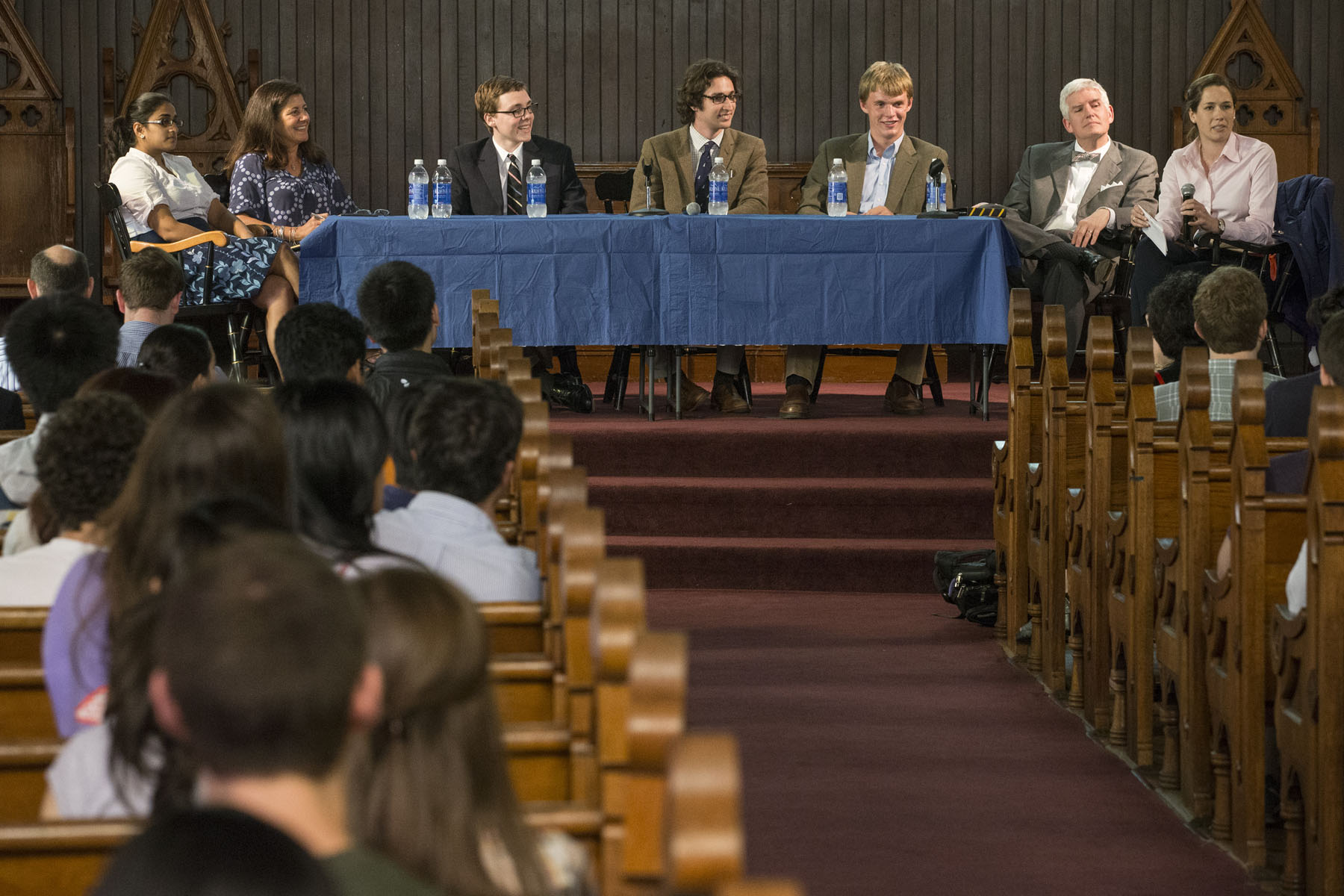In the wake of the late February referendum that altered the University of Virginia’s 170-year-old honor system, the Honor Committee hosted a town hall meeting Thursday afternoon in the University Chapel to discuss the changes and the system’s future.
About 64 percent of the 8,441 students who participated in the vote favored a new “informed retraction” option that allows a student to plead guilty after being accused of lying, cheating or stealing, but before a formal investigation begins, in exchange for a two-semester suspension from the University. Previously, the lone sanction for committing an honor offense was permanent expulsion.
The vote surpassed the 60 percent supermajority needed to pass a change to the honor system, explained Evan Behrle, the newly seated chair of the Honor Committee, who sat on a panel of six speakers along with three other student leaders, Dean of Students Allen Groves and Darden School of Business adjunct professor Sherri Moore. Margaret Grundy from the Dean of Students office was the moderator.
A second proposal on the same ballot, put forward by the Honor Committee, garnered only 41 percent support. That proposal, called the “Restore The Ideal Act,” paired the informed retraction option with a second major change: honor trial juries would be randomly drawn from the members of the Honor Committee, rather than randomly drawn from the entire student body.
Trying to interpret why the proposed jury reform was roundly rejected was a theme that was revisited several times during the 90-minute discussion, which was driven by questions from the audience of more than 100 students.
The Honor Committee’s motivation in creating its Restore The Ideal Act proposal was to remove the incentives for an accused student to lie during an honor trial, and to enhance the incentives to tell the truth, admit guilt and take responsibility, Behrle said.
The committee “started from the fundamental discomfort that lying was rewarded by the system – that the only people who were ever found guilty, for the most part, were people who admitted the act,” he said. The informed retraction was created to give students more incentive to admit their guilt and take responsibility, he said. The committee reasoned that they could disincentivize lying by relying on more experienced jurors: members of the Honor Committee who had participated in multiple trials.
Whatever the motivation for the jury reform proposal, many students bristled at the notion that the average student should not be trusted to serve on the jury, said Moore, who teaches a business law class.
The Honor Committee is not concerned about entrusting students to be jury members simply because they are students, Behrle said, but rather because they show up for jury duty with no prior experience with the honor trial system, which is led by the jury, in contrast to the U.S. legal system. In an honor trial, the jury asks the questions and calls witnesses.
“There's something perverse about taking a student who has never seen a trial and putting them at the front of the room where the jury panel sits and saying, ‘OK, this is your show’,” Behrle said.
“The student body made its voice heard,” in the February vote, said Cavalier Daily columnist Forrest Brown, one of the panelists. The results said that students want to have people outside the management of the Honor System to make final call on trial verdicts. “That’s key,” he said, and similar to the American court system.
The February vote rejected one jury reform proposal, “but the system’s problems are real and should be addressed.”
Student Council President Eric McDaniel echoed Brown. “I’d really love to see jury reform tackled.”
Possible options for jury reform, Brown said, include requiring students to opt in for possible jury service, better juror training or “mixed juries” that would include some jurors who are somehow experienced with the trial system.
“An opt-in jury system would cut down the pool greatly, but would probably create a jury that has all qualities the reformers would want, without having the problems that the student body saw in that proposal,” Brown said.
There was plenty of discussion of problems with the honor system. Moore said that she had polled students in her business law classes, using anonymous clickers. Almost 98 percent of students reported that they had witnessed an honor offense, but only around 1 percent reported ever having taken any action to report an offense.
Moore also recounted how a fellow faculty member had warned her that he had initiated honor proceedings 15 times, and not one student had been found guilty.
Faculty members’ complaints about the system are twofold, Groves said. Some have participated in an honor trial and had a terrible experience. Others decline to use the system because they think expulsion is an inappropriate punishment.
Almost all the panel members noted that the process of putting forward the reform proposals, and the strong participation in the vote on those proposals, greatly increased student interest in the system, and reformers should try to build on that momentum to make further proposals.
A number of suggested changes were discussed including adding an admission essay question about the honor system to prompt students to think more deeply about the system even before they arrive on Grounds.
Multiple students suggested that the honor system be expanded to address sexual assault or rape. Behrle noted that the three actions currently covered by the honor system – lying, cheating and stealing – all involve undermining the bonds of trust within a community. He added that sexual misconduct is in the same vein. “I would like to see us have that conversation.”
Media Contact
Article Information
April 19, 2013
/content/panel-mulls-meaning-recent-honor-system-vote-and-challenges-ahead

